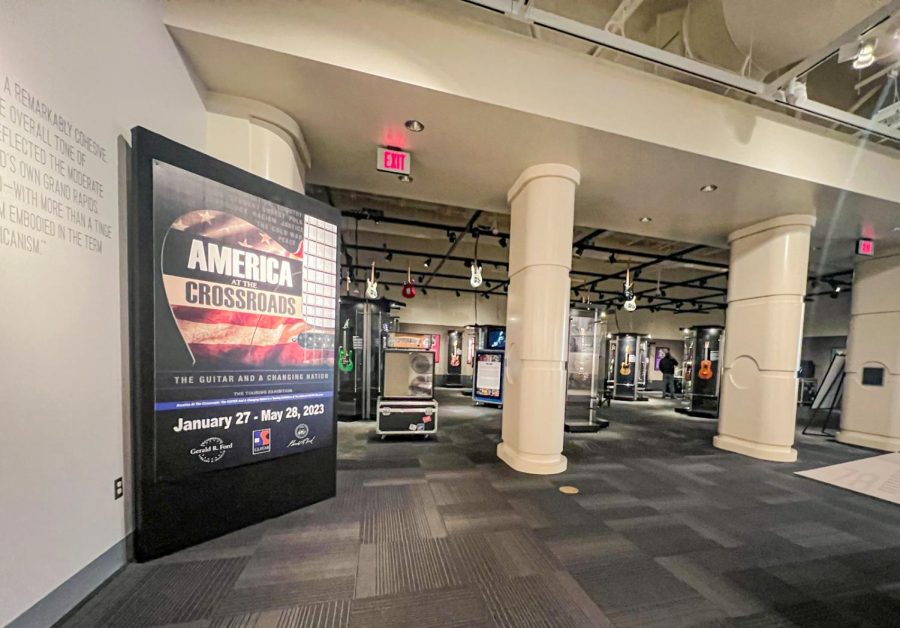Gerald R. Ford Presidential Museum opens guitar history exhibit
Feb 6, 2023
“America at the Crossroads: The Guitar and a Changing Nation,” a traveling exhibition curated by the National GUITAR museum, has been welcomed into the Gerald R. Ford Presidential Museum in Grand Rapids. The exhibit traces the importance of the guitar’s role throughout history in relation to social events and cultural movements.
Meant to take viewers on a musical journey beginning with instruments dating back to the 1500s, the collection uses the guitar as a medium for interpreting America’s history and its musical evolution. Containing 40 guitars spanning from archival to electric alongside interactive videos and banners, the exhibit delves into the cultural happenings of each historical and musical time period.
“The guitar is the most popular instrument in America, and using it to tell the history of America is a really unique way to look at the culture surrounding significant events in our history, ranging from colonialism to punk rebellion,” said HP Newquist, executive director of the National GUITAR Museum.
Newquist said the exhibition highlights the importance of the guitar in American pop culture and its ability to tell the country’s narrative in a unique format.
The instrument can be used as a tool to discover complex information about the past and the historical developments that have played a role in American society.
“The guitar has been a symbol for everything from generational differences and racial divide to politics, consumer marketing and fashionable relevance,” said Mirelle Luecke, supervisory curator at the Ford Museum.
Previous to “America at the Crossroads,” traveling collections by the organization ranging from guitar design to explorations on the scientific value of sound had been assembled. A venture into its history was the next step.
Hearing about the exhibition’s development, the Ford Museum reached out to the National GUITAR Museum, which began the process of bringing the musical collection to Grand Rapids.
“The 1970s – the period in which Gerald Ford was President – was (an) important decade musically, with the rise of genres like pop, disco, techno, hip hop and punk rock,” Luecke said. “Additionally, Ford, like so many Presidents, invited musicians like George Harrison of the Beatles, to the White House, so we felt that the exhibit fit within our themes.”
In 2017-18, the Ford Museum displayed an exhibit by the Rock and Roll Hall of Fame that focused on rock music and its fusing of politics. However, this exhibition represents a different perspective of interpreting history through the instruments themselves.
The National GUITAR Museum is the sole organization devoted to guiding visitors of their traveling exhibits through the impacts of guitar on society. Their Board of Directors includes names of notable guitarists such as Tony Iommi of Black Sabbath and Deep Purple’s Ritchie Blackmore.
“The National GUITAR Museum is the only museum in existence that is actively involved in promoting and preserving the legacy of the guitar,” Newquist said. “We serve as a source for information on the cultural relevance of the guitar over the past 500 years.”
Luecke said college students can explore the guitar’s involvement in the protest movement of the 1960s, of which university attendees played a large role. The youth have always been active in counterculture, often through groundbreaking music that defined generations.
Students who play guitar can learn more about the instrument and its influence on their personal lives or gain insight into their favorite music’s development through this informative exhibit.
“Having history presented without the routine of repetitive, linear descriptions of people and events is always a breath of fresh air for students,” Newquist said.
The exhibition will be on display at the Ford Museum through May 28. More information can be found on the National GUITAR Museum’s website.

























